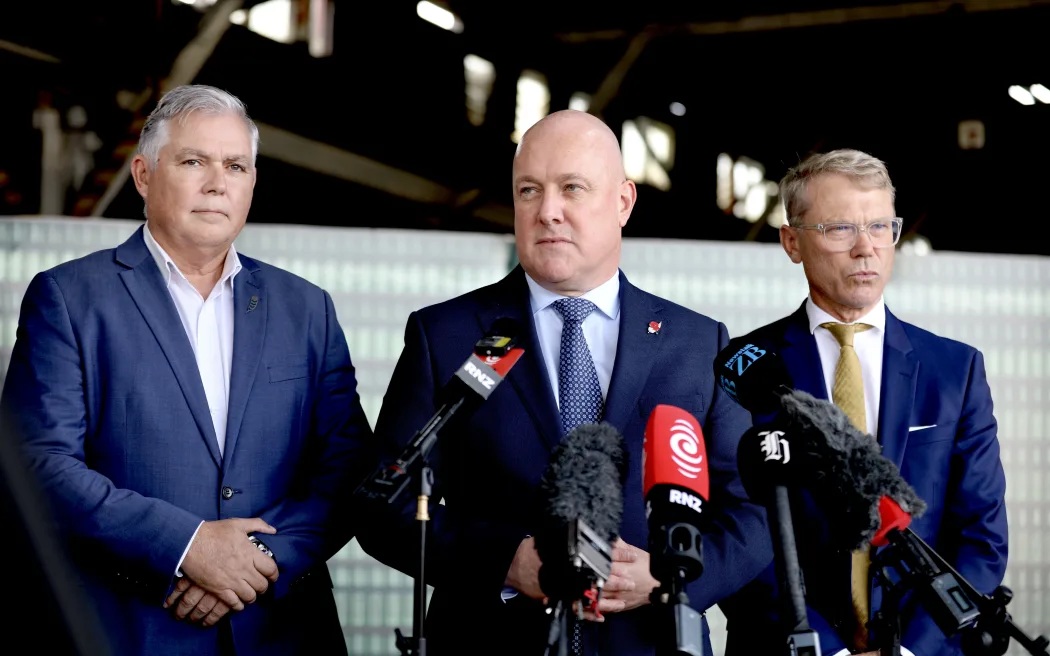
The coalition says its tough-on-crime approach is working as a new survey reports 38,000 fewer victims of serious violent crime.
The figure is close to double the government's target of 20,000 fewer victims of assault, robbery or sexual assault each year by 2029.
The Justice Ministry's latest Crime and Victims Survey has reported 147,000 victims of serious crime in the 12 months to August.
That's 38,000 fewer than the last year, and 9000 fewer than the last update in May.
The government banned gang patches in public places and gave police more powers to disrupt gatherings this time last year.
Police Acting Assistant Commissioner Corrie Parnell told Morning Report the gang legislation had provided police with a significant tool "to make an impact and disrupt the gangs".
The gang legislation has had an impact on serious violence in public places contributing to the 38,000 fewer victims of serious violence as of August this year, he said.
"It's that broader feeling of safety and context for communities, so if you think of the number of gang funerals for example, we've got a quite high presence there now with police, early engagement with gangs and basically shifting the dial on what is acceptable in communities."
Gangs play a key part in organised crime both in New Zealand and trans-nationally, he said.
"The ability to attack it from multiple angles, not just the Gang Act legislation, we've also had the criminal activity intervention legislation which gives us that ability when you know gangs are in conflict in our communities to actually make meaningful search and seizure there."
There were about 10,000 gang members on the police national gang list as of November this year, he said.
"There's still work to be done but the suite of legislative powers that police are able to use now are far more advanced than we've previously had."
Work such as strengthening New Zealand's borders was still in the area of trans-national organised crime, "the organised crime linkage back through to gangs and offshore", he said.
Quick statistics since the Gangs Act (2024) came into effect:
- 182 patches seized
- 643 insignia items seized
- 178 firearms seized
- 856 charges for Prohibited Display of Gang Insignia in Public Place
- 255 finalised charges, 188 convictions.
Justice Minister Paul Goldsmith said decreasing victim numbers showed the coalition's tough approach to law and order was working.
"That's 38,000 families and individuals that don't have to go through the trauma and horror of violent crime, so it's good," Goldsmith said.
"We've made good progress but obviously there's still a long way to go."
Police Minister Mark Mitchell said he made no apologies for getting tough on law and order.
"One year ago, gangs were confronted with a new harsh reality - one where they can no longer behave as if they're above the law by taking over our streets, intimidating the public, and making a mockery of our criminal justice system," he said.
"This is tough legislation. That is the point. Gang members make up less than one quarter of one percent of the New Zealand adult population, yet are linked to about 18 percent of serious violent crime."
"The few examples where patches have been returned to gang members is not at all representative of just how successful these laws have been. The numbers speak for themselves."
Goldsmith said the changes to gang laws were part of a broader crime strategy.
"The most important thing about the gang patch ban is that it has greatly reduced the intimidation and presence of gang members in public.
"There was a sense of them taking over some parts of the country, some small towns, and a sense of their presence was concerning to many New Zealanders.
"So, that's helped on that front but the gang patch is one part of many different tools we've given the police to deal with gangs, which is also one part of a broader strategy, which is about restoring consequences for crime and holding people to account."
He said victim numbers were still too high for his liking.
"I'm extremely mindful that we still have far too many New Zealanders being a victim of crime so we want to keep going much further and keep driving that level of crime down so that New Zealanders feel safe in their communities."
Asked if it was time to set a new target, Goldsmith said it might be something to consider in the New Year.












